Harnessing the power of music to improve mental health
Engaging with music has proven positive impacts on mental health and well-being, yet musical interventions are rarely used in healthcare settings. Professor Gilles Comeau, from the University of Ottawa in Canada, hopes to change this. He has established the Music and Mental Health Research Clinic to explore the relationships between music and mental health and to develop ways of integrating music into healthcare services.
Talk like a music researcher
Cognitive — the processes related to conscious intellectual activity, such as thinking and remembering
Dalcroze Eurythmics — a method of music education based on the connection between music and body movement, developed by Émile Jaques-Dalcroze in Switzerland in the early 1900s
Dementia — an umbrella term referring to a range of progressive conditions with symptoms including memory loss, confusion and impaired cognitive ability
Electroencephalography (EEG) — the measurement of electrical activity in parts of the brain
Hormone — a chemical that regulates the body’s functions
Motor control — the ability to control your own movements
Physiological marker — a biological state that can be measured to evaluate the body’s function or response to an intervention, e.g., heart rate
Have you ever felt happier after listening to music, playing an instrument, singing a song or dancing along to your favourite tunes? Interacting with music can have significant benefits for both your physical and mental health, meaning music can play an important role in your well-being. “Participating in musical activities can help cognitive function, reduce the risk of developing mental illnesses and reduce the severity of existing mental health conditions,” says Professor Gilles Comeau, Director of the University of Ottawa’s Music and Health Research Institute and of the Music and Mental Health Research Clinic at The Royal, a specialised mental healthcare centre. Gilles is convinced of the power of music for improving health and well-being. His mission is to make healthcare-related music participation accessible to all who will most benefit from it.
The benefits of music
“Music is particularly powerful because it is a complex, but accessible, activity,” explains Gilles. “Music is complex because it involves multiple senses. For instance, sound, vision and touch are integrated together when playing an instrument.” The benefits of music are spread across the spectrum of physical and mental health. For example, engaging with music triggers the release of dopamine, the ‘feel-good’ hormone that elicits feelings of pleasure and reward. “Music is also a powerful tool for promoting cognitive well-being,” Gilles adds. “Introducing new skills and new knowledge ignites curiosity and cognitive growth, which can be especially valuable for older adults.”
Collective music-making can be a form of social cohesion. It has the power to connect people, which helps to combat social isolation. However, many individuals who could most benefit from such music-making activities are commonly excluded from mainstream music participation. “People with mental health issues, physical limitations or cognitive impairments often experience an unwelcome reception when trying to involve themselves in musical activities, even if their impairments do not hinder their ability to participate in collective music-making,” says Gilles. “Bringing music to these vulnerable populations can help overcome feelings of exclusion and isolation.”
This is not just about improving the well-being of individuals; it is also supporting a fundamental human right. “The Human Rights Act emphasises the need to provide equal opportunities for engagement in the arts,” says Gilles. “That means all people, including marginalised populations, should have the chance to foster their artistic aspirations and take advantage of the health benefits of music participation.”
The Music and Health Research Institute
The Music and Health Research Institute aims to increase the body of research into the links between music and both physical and mental health, and to provide ways to implement these research findings. “We explore interactions between music and health with the aim of developing solutions to improve well-being for individuals and communities,” explains Gilles. “Our vision is to increase our understanding about how best to integrate musicians and music educators into healthcare and social settings.”
In practice, this takes a variety of forms. The institute develops music programmes for vulnerable populations and individuals with certain mental health conditions, ranging from mood disorders to substance dependencies to dementia. “We also provide best-practice guidelines and strategies for training musicians and music educators, so they can bring their skills and knowledge to healthcare settings,” says Gilles. “On the healthcare side, we raise awareness among health and social care professionals about the benefits of community-based musical activities.”
Gilles’ own research focuses on how music can benefit older adults and combat age-related health conditions. “Playing music can help combat conditions including dementia, depression, anxiety and signs of physical decline such as frailty, loss of balance and poor posture,” says Gilles. “Moreover, collective music-making combats social isolation and loneliness, which are often serious issues among older people.”
Moving to music
Research has demonstrated that music participation involving movement is especially impactful for improving physical and mental health. “We are using a method of interactive music education called Dalcroze Eurythmics, which focuses on body movements to music,” says Gilles. “A typical class involves participants moving to music, using a mix of improvised movements alternating with structured, choreographed rhythmic sequences, and sometimes featuring props such as balls or hoops.” Dalcroze Eurythmics has promising health benefits for many different populations, including children, adults with post-traumatic stress disorder (PTSD) and older adults with cognitive impairments. “Musical activities that involve movement also build strength and motor control,” says Gilles. “The dual tasks of listening to music and translating what is heard into movement have benefits to physical and cognitive health.”
Gilles emphasises that programmes such as Dalcroze Eurythmics are not necessarily a one-size-fits-all solution, and that research is needed to show what works best for different people. “It is important to test each programme multiple times with different people experiencing various mental health conditions to establish its full benefit – what works, for whom and in what context,” he says. At the Music and Mental Health Research Clinic, the team is now developing additional interactive music-making programmes, including percussion ensembles and drumming improvisation workshops.
Exploring the science behind music for mental health
It is important to provide evidence that musical intervention programmes, such as Dalcroze Eurythmics or percussion ensembles, are actively benefiting their participants. “Research into music and mental health requires expertise from many fields,” says Gilles. “This is why the Music and Mental Health Research Clinic has established partnerships with a wide range of researchers across Canada and beyond.”
For instance, some researchers are measuring physiological markers to quantitatively assess individuals’ well-being before, during and after participation in musical activities. “Physiological markers of anxiety include breathing rate, heart rate, sleeping patterns and levels of the stress hormone, cortisol,” says Gilles. Other techniques measure participants’ physical capabilities, for example by conducting tasks to assess motor control or using thermal imaging to measure muscle inflammation. Cognitive tests, such as puzzles, and electroencephalography (EEG) can measure participants’ mental performance. “We also use qualitative measurements, including questionnaires to ask participants about their moods, such as feelings of depression and anxiety, and their overall sense of mental well-being,” explains Gilles. “In combination with interviews and focus groups, we can gain an understanding of how our programmes benefit participants’ mental health.”
Reference
https://doi.org/10.33424/FUTURUM437
© University of Ottawa
Gilles is exploring whether Dalcroze Eurythmics, in which participants move to music, improves mental health
© Steven West Photography
© Steven West Photography
© University of Ottawa
Through these research efforts, Gilles hopes that the benefits of music will become available to everyone to improve health and well-being.
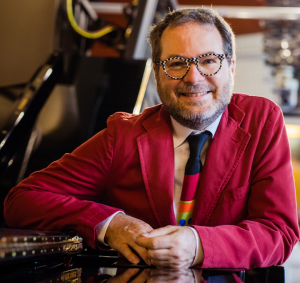 Professor Gilles Comeau
Professor Gilles Comeau
Director of the Music and Health Research Institute, University of Ottawa, Canada
Director of the Music and Mental Health Research Clinic, University of Ottawa Institute of Mental Health Research, The Royal, Canada
Fields of research: Music, Mental health, Wellness, Well-being
Research project: Investigating the effects of music participation on mental health and well-being, and how to integrate musicians and music educators into healthcare settings
Funders: Public Health Agency of Canada, Social Sciences and Humanities Research Council (SSHRC), Brain and Mind Research Institute, Canadian Foundation for Innovation, Private Donors
About music for mental health
Studying the interactions between music and mental health calls for collaboration across different academic disciplines, along with practitioners from the health and social care sectors. The work of the Music and Health Research Institute and the Music and Mental Health Research Clinic presents useful case studies of how a diverse range of careers can work together to address a common theme.
“For our work, we assembled a multi-disciplinary team of researchers, practitioners and community organisations to pursue action-based original research,” says Gilles. “On the research side, our team brings together music educators, biomechanists (who study the mechanics involved in the movement of living organisms), kinesiologists (who study human movement), psychologists, neuroscientists, computer engineers with experience in the medical field, physicians specialised in geriatrics (the branch of medicine focused on the health and care of older people), and psychiatrists specialising in particular mental illnesses.”
Beyond the academic research world, Gilles’ team includes health workers, clinical practitioners, social workers and community workers. “We also work with the people who can benefit from our research,” says Gilles. “This includes people with disabilities, people experiencing mental illnesses, older people, patients in care, and their families and support groups.”
The fact that this research brings together such diverse fields indicates the vast range of career opportunities related to music and mental health. “For instance, those interested in neuroscience or psychology can study how the brain processes music under various health conditions,” says Gilles. “Those interested in music and education can develop innovative teaching and learning practices, while those interested in healthcare and rehabilitation can study how music improves health outcomes.”
Pathway from school to music for mental health
• “It is important to note that you do not have to choose between studying music and science,” says Gilles. “Many students think that they must make a decision to study one or the other, but if you are interested in music and science there are a number of university programmes that now allow you to combine both.”
• Gilles emphasises that the broad range of careers available in the field of music for mental health means you can pursue whichever subjects most interest you (e.g., psychology, rehabilitation, biomedical engineering, etc.) and integrate these with music, allowing you to tailor your study programme to lead to your desired career.
• Studying social sciences, health sciences, biology, medicine or engineering, as well as music itself, could lead to a career using music to improve people’s mental health and well-being.
Explore careers in music for mental health
• As Gilles highlights, a huge range of people are involved in his research investigating the impacts of music on mental health, meaning there is a wealth of career opportunities available in the field.
• The Music and Health Research Institute offers a variety of ways to get involved, such as training and mentoring opportunities for undergraduate students and a programme of events throughout the year: www.uottawa.ca/research-innovation/music-health/training-mentoring
• Music therapists combine healthcare and musical expertise to provide therapeutic support for individuals: www.careerexplorer.com/careers/music-therapist
Meet Gilles
I have always had a passion for music and teaching. I am fascinated by how people learn and how teachers develop teaching strategies, and I have played music from a young age. I started teaching piano lessons when I was in my late teens. Then, while I was at university, I established a community music school for preschool children and a summer music programme for children of all ages. After graduating, I organised a programme to train music teachers.
My career has been driven by my strong desire to always learn new things and to develop initiatives with real impact. When I was hired at the University of Ottawa, there was no research into piano pedagogy (the theory and practice of teaching) and most piano teaching was based on traditional methods along with trial and error. This led me to establish the Piano Pedagogy Research Laboratory, a long and fruitful partnership with colleagues from across scientific disciplines.
When I became aware of the physical and mental health problems that many musicians experience, which often begin at a young age, I established the Musicians’ Wellness Centre to educate, conduct research and provide treatment related to musicians’ wellness.
Recently, I have become interested in the health benefits of music-making. I began to research how musicians and music educators can be integrated into healthcare settings so that music can be used to provide health benefits. I have a fundamental belief that music can make a unique and positive contribution to the well-being of individuals and communities.
We are seeing a move towards a more holistic approach to health. This is leading researchers and healthcare practitioners to investigate alternative approaches to aiding well-being. One such therapy, which is in increasing demand, is music-making.
Interestingly, sport is widely recognised as an important platform for inclusion and well-being for people with impairments. Sport has played a key role in advancing equity, through programmes such as the Paralympic Games. However, nothing similar exists for music, despite music being arguably just as universal and as important for health and well-being. I hope to see music-making positioned in a similar way.
I have a sincere hope that young people can help bring about an increase in music accessibility. Equity, diversity and inclusivity should be the new face of music-making. These increase the potential for rich and meaningful interactions and contributions to self-expression, as well as connections to self, others and the community. I hope that the next generation will work to make it possible for all people to have equal opportunities to foster their musical aspirations.
Do you have a question for Linda, Megan, Roman or Taya?
Write it in the comments box below and Linda, Megan, Roman or Taya will get back to you. (Remember, researchers are very busy people, so you may have to wait a few days.)

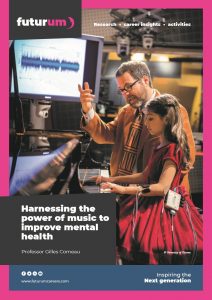
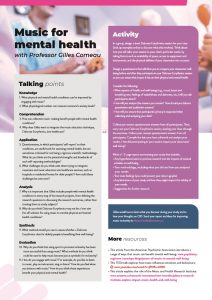
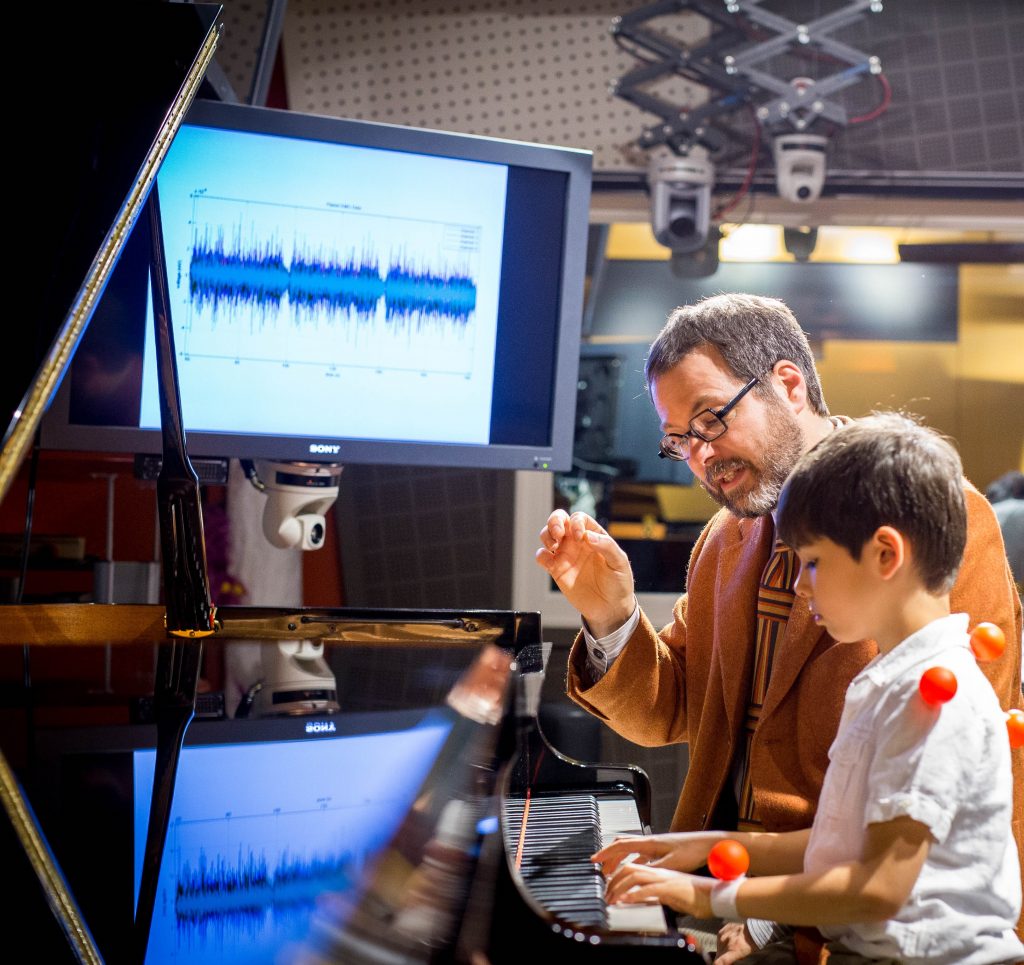
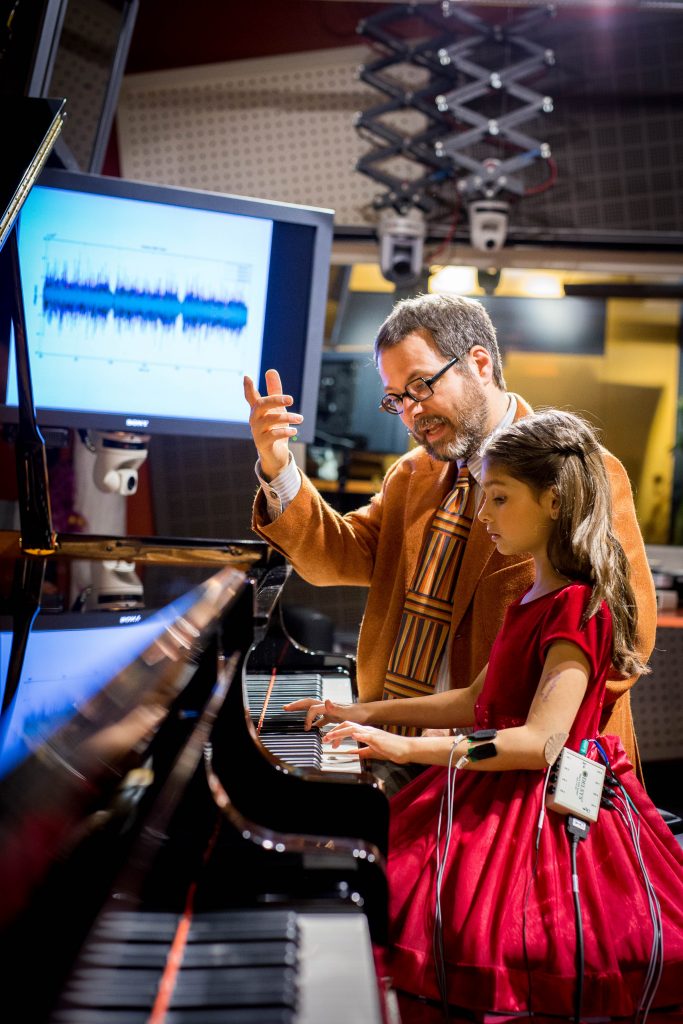
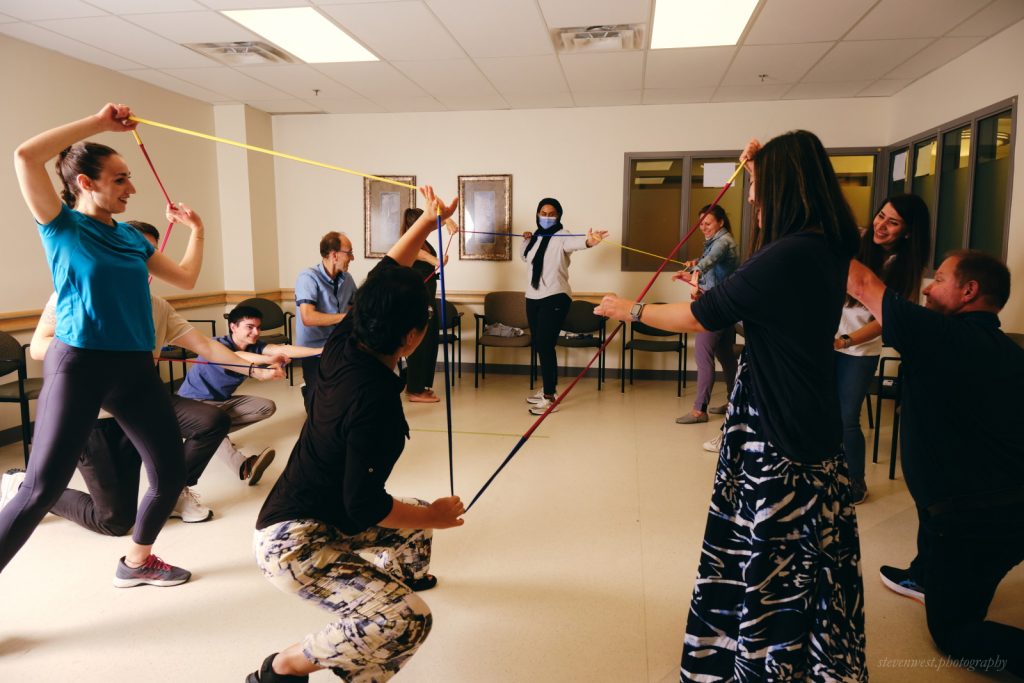
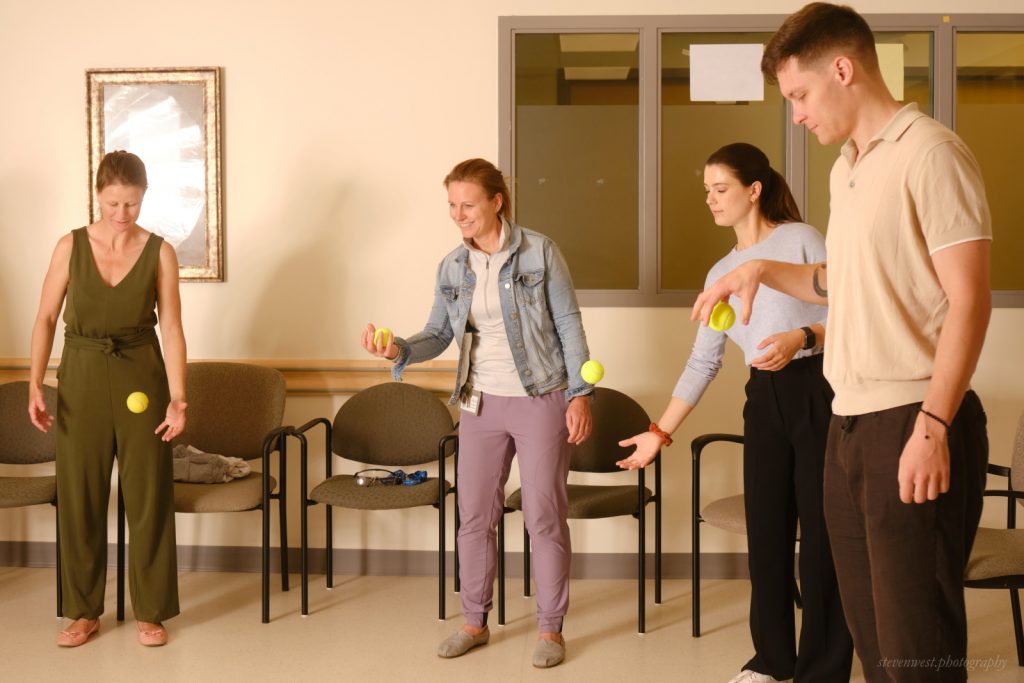
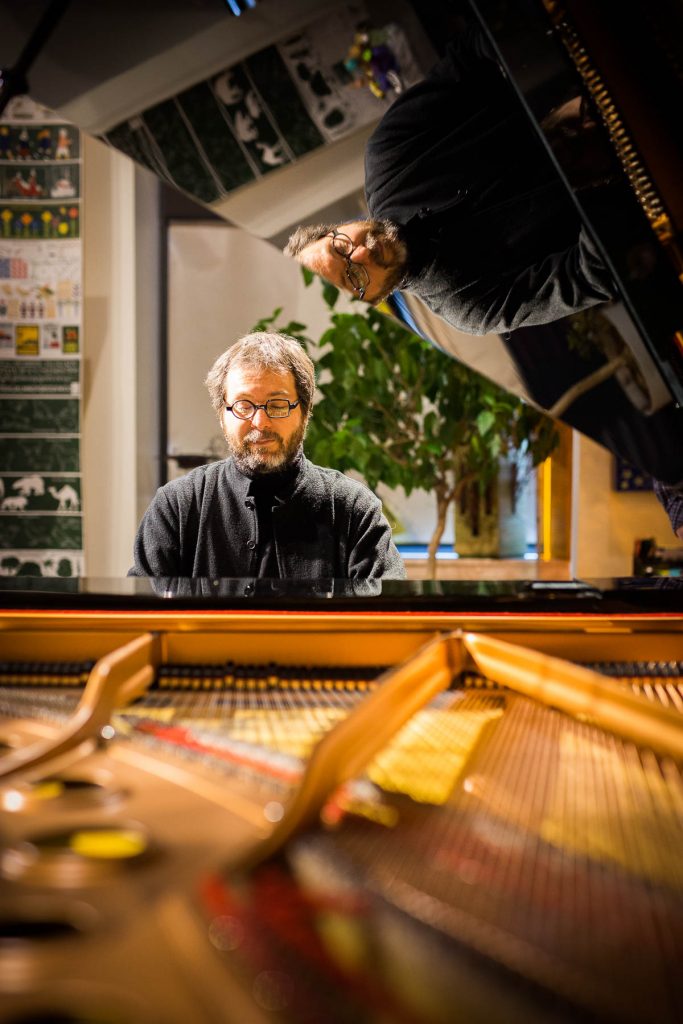
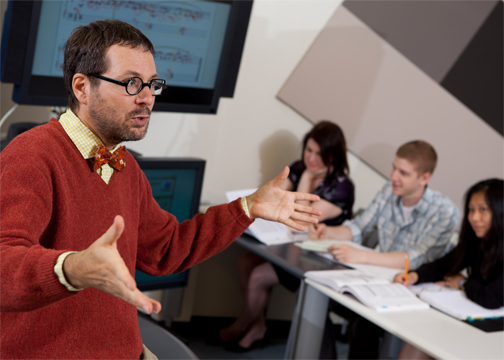
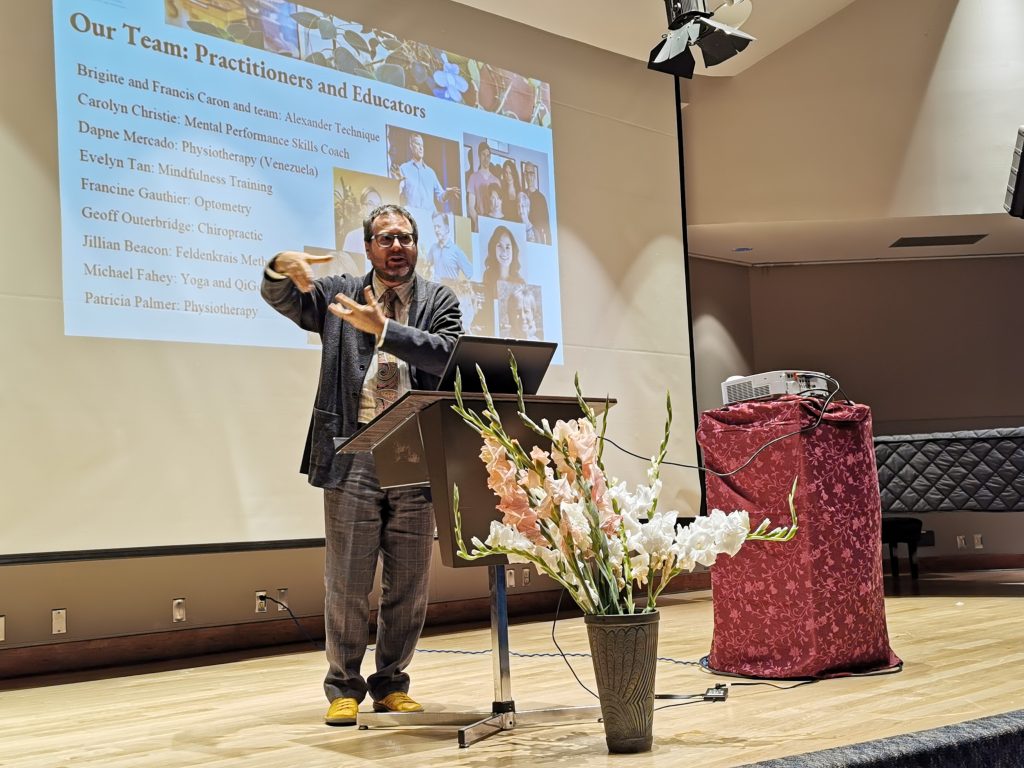
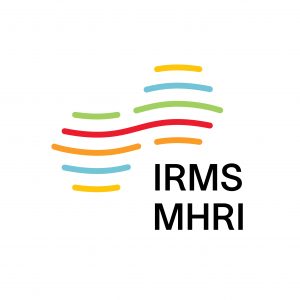
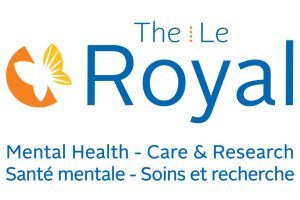

I really enjoyed reading this articles and i enjoy music many people hopefully music really does help other people because it has helped me in many ways. I enjoy how this article was different from the other ones I have seen on this website. This articles has many facts and i liked how you added a dictionary or vocab. I enjoyed it! Thank You!
Thank you for taking the time to provide a comment.
I really enjoyed reading this article.It showed me the other side of music. I have learned a lot of new information , for example that listening to music releases dopamine and cognitive well-being as some of the positive effects of music. It also was a pleasure reading that scientists are starting to use music as a healing method.Music also helps me in many ways, for example when I’m moody or lonely I listen to positive music to bust my energy. Music also helps me with anxiety, by listening to songs that calm me down and bring me back to a good memory in my life. This is one of the reasons how music helps me in my life.
The question that I would like to ask the professor Gilles Comeau.
Are you glad that you have dedicated your life to music and whether you regret your decision?
I am very happy that I was able to choose music (more specifically music education) as my career path. My interest in music helped me branched out and learn about music and the brain, music dyslexic, technology and music learning, and of course, the benefits of music on health and wellbeing.
One other great thing about the work that I do is the ‘real’ impact that my research can have on people. It is very tangible and brings me great joy.
I want to thank you for taking the time to share your thoughts on your own experience with music.